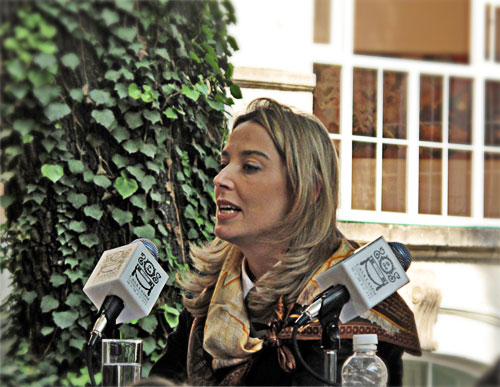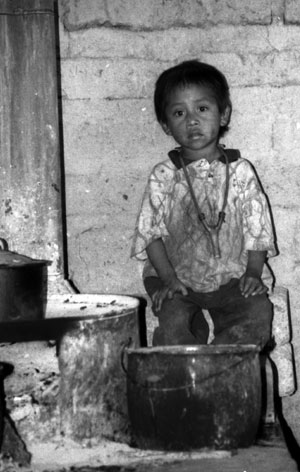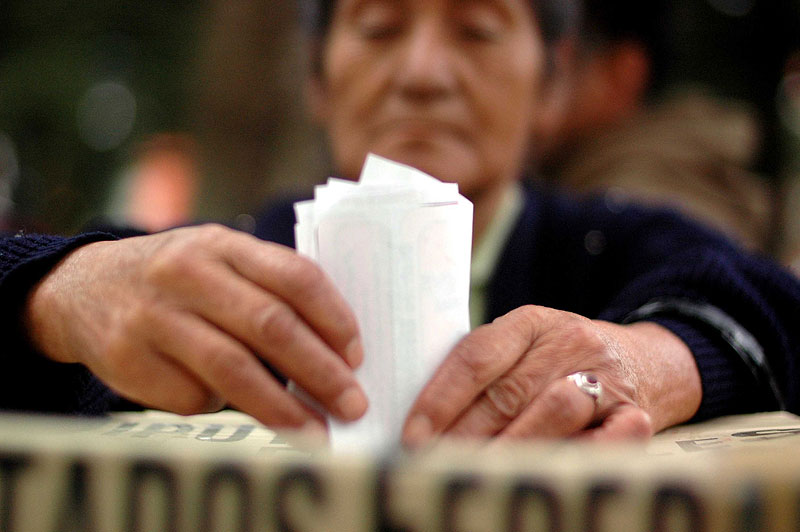ARTICLE : The struggle of women against exclusion
“We have seen aspects of culture that should be maintained from our ancestors but that the customs of some communities aren’t all good, because it is the men who continue to hold control and power over the land, even if it is we who work it; also in some communities in which the majority of the authorities are men, they seek to impose agreements that do not take into account the words of all.“
On 6 and 7 November there was held the Meeting of Women in Resistance and Hope to Defend our Mother Earth and the Land in San Cristóbal de Las Casas. The event was facilitated by the Fray Bartolomé de Las Casas Center for Human Rights and organized by women of several different communities and organizations in Chiapas. During the event, women expressed their preoccupations regarding the exploitation of their lands on the part of the government and large companies, the presence of police and soldiers in their communities, and the divisions brought about at the community level by government projects. The final communiqué also indicated the cultural limitations that women sense with regard to their participation in communal affairs, seen for example in their assertion that “[men] don’t take into account the words of all.”
As is noted by Asunción Ponce Ramos, coordinator of the Regional Coordination of Communal Authorities-Communal Police (CRAC-PC) of Guerrero, women can only be “fools” to attend the communal assemblies carried out in many places in Mexico. The autonomous-justice system of the CRAC-PC, which celebrated its fifteenth anniversary this October, has included the participation of women from its birth, but the question of their participation continues being to be a challenge. “Sometimes they discriminate against women, or even expel them. There are those who stay for one or two years, but never for three,” emphasizes Asunción Ponce.
But surely advances have been had, if the situation is compared with that of previous decades. A participant in the assemblies of the Diocene Coordination of Women (CODIMUJ) of San Cristóbal de Las Casas, originally from the municipality of Comalapa, commented that, 30 years ago, when women of her communities began to organize themselves, there were only 3 or 4 women, while now there are 16. She explains that men previously forbade them from participating in meetings, but that women now can participate more. The women in the CODIMUJ assemblies have been able to transcend the prejudices of their communities of being “loose women” or for “leaving their children alone” so as to come to train themselves to intrepret life “with the eyes, mind, and heart of women.”
The struggle of Zapatista women has resulted in the development and implementation of the Revolutionary Law of Women. During the final days of 2007, there was held in the caracol of La Garrucha the First Meeting of Zapatista Women with the Women of the World, a privileged moment in which they could make-know their processes and challenges to the world. The meeting was organized, coordinated, and carried out by women. Men could be present, but only in support of the women: cleaning dishes, cooking, cleaning, and caring for children. A poster in the entrance announced that it would be thus during the days of the event but that afterward everything would return to being “normal.” During a few days then, the structural exclusion of campesina and Zapatista women, as well as that of women from around the world, from public spaces was analyzed. That everything would return to being “normal” after the end of the meeting indicates that this proposal was a bold one—or, as Asunción Ponce Ramos would say, “foolish“—given that public spaces normally belong to men, thus perpetuating women’s exclusion. Regardless, the efforts and work carried out by Zapatista women within the Zapatista project of the construction of autonomy have resulted in a greater representation of women and children within the system: women occupy charges in the Good-Government Councils, work as health- and education-promoters, and girls are included in the educational system like boys, in contrast to historical realities.
In the same way, the women who attended the Meeting of Women in Resistance and Hope to Defend our Mother Earth and the Land at the beginning of November confirmed their desire to continue building an equitable society in which women, men, girls, and boys can participate, exercising and defending their rights. Highlighting the strength of united women, they affirm that “[t]he flowers that we here share symbolize the union of women, communities, and organizations that have the hope of continuing together to strengthen themselves to press forward.”



